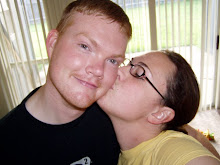Hello, my name is Eric. I am Sarah's husband, and she has asked me to write to explain what happened during my trip over the last few days. You see, I am using my VA benefits to go back to college, where I am about the enter my Senior year as a Computer Science major. Last summer, I worked an internship in Beaumont, TX, in which I ended up writing a research paper that was published in the International Journal of Information Technology. Based on this research paper, I was recruited to attend an engineering skills competition at Johnson Space Center, where I spent the past few days competing.
The program is called the College Aerospace Scholars program. Now, I know what some of you are thinking, and I thought it at first too......Can a Computer Science major attend an engineering skills competition? The answer is yes, because the definition of an "engineering program" has changed recently. Now, as long as you are a STEM (stands for Science of Technology, Engineering, or Mathematics) major, and your program is accredited by an association called ABET, then you are considered to be an engineering major. In my case, I qualified because my school holds the accreditation, and Computer Science is a Science of Technology field.
Anyway, when we got to the competition, we were broken into teams. There were seven teams, each with six members, for a total of 42 competitors. NASA chose seven people to act as the lead Project Engineers for each team, placing that person in charge of the team. These seven people, myself being one, were the seven who NASA recruited to attend the program (everyone else had to go through an application and acceptance process).
We were told that our teams were competing for a fictional contract to build the next Mars rover. Each team spent a couple of days trying to build a robot that could run through an obstacle course simulating a martian environment, and analyze and collect rock and water samples. Naturally, it is not easy to accomplish such a task in two days worth of time. I had to give everyone on my team specific tasks, monitor their work, and help them solve engineering problems that came up along the way. Naturally, everything that could have gone wrong did, and I was running around like crazy trying to get this thing planned and built in time.
Somehow or another, the robot that my team built happened to perform slightly better than any other team on the obstacle course. So, the only thing we had left to do was make a proposal to actual NASA engineers about why our robot was the best and should be considered for our hypothetical mission to Mars. This was not an easy proposal to give. We had to give the technical details of our robot, a look at what the budget would have to be in order to conduct an actual mission to Mars using our robot design, and answer questions from a field of NASA engineers who were looking for an excuse to discredit our design. To make it worse, we had to present this orally in front of all of the other competitors, the judges, and a large group of other NASA engineers who took the time out of their day to see what sort of ideas we had come up with. In all, we gave our presentation in front of about 150 people.
Those of you who know me well know that I am an extremely good presenter and public speaker. So I gave our team's presentation personally, and we completely blew the competition away. In the end, my team was judged to have won the contract for the fictional mission to Mars. This means that we won! And since I was the Program Engineer for the team, I was the overall winner of the competition.
Since this was a state wide competition for the seven of us who were recruited, NASA officially considers me to be the top undergraduate engineering student in the State of Texas. I talked to them briefly about working an internship with them right after I graduate, but I really don't think I will do it. There would be no guarantee of a job when the internship is over, and quite frankly, I don't qualify for the super cool aerospace engineering jobs at NASA anyway.
But I can now live the rest of my life knowing that NASA once considered me to be the top undergraduate engineering major in the State of Texas, and that's pretty cool if you ask me.



















No comments:
Post a Comment